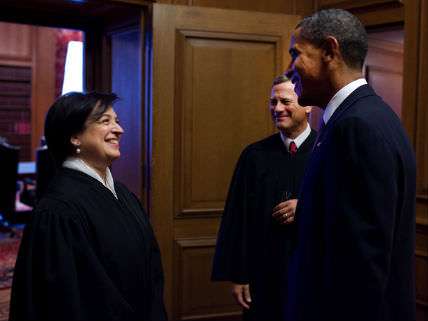What's at Stake in Monday's Hobby Lobby Ruling from the Supreme Court

On Monday morning, the U.S. Supreme Court is expected to announce its final decisions of the 2013-2014 term. Only two cases still remain undecided, and one of them is perhaps the most closely watched case of the year: Burwell v. Hobby Lobby Stores, Inc. At issue is the so-called Obamacare contraceptive mandate, the provision of the Patient Protection and Affordable Care Act which requires most businesses to cover birth control in their employee health plans. What are the legal issues at stake? Here's a rundown from my recent column on the case:
According to Hobby Lobby Stores Inc., an arts-and-crafts retailer owned and operated by a family of evangelical Christians, the contraceptive mandate forces both the business and its owners to violate their religious scruples by providing access to four methods of birth control they see as equivalent to abortion, such as the emergency contraceptive Plan B.
That requirement, Hobby Lobby maintains, violates the Religious Freedom Restoration Act (RFRA), a 1993 law signed by President Bill Clinton which says the government may not "substantially burden a person's exercise of religion," unless it has a "compelling" justification and has used "the least restrictive means" available. The contraceptive mandate, Hobby Lobby told the Supreme Court in its main brief, "is a textbook 'substantial burden' on religious exercise under RFRA."
The mandate's defenders take the opposite view, arguing that Hobby Lobby should lose because a for-profit corporation is unable, by definition, to exercise religion. As David Gans of the liberal Constitutional Accountability Center put it, "corporations cannot pray, do not express devotion and do not have a religious conscience." Therefore, he argued, "the justices should reject the notion that a corporation is a person that exercises religion."
During oral arguments in March, the justices appeared closely divided over these issues, peppering the lawyers on each side with a series of sharp questions.
"Every court of appeal to have looked at the situation have held that corporations can bring racial discrimination claims as corporations," Chief Justice John Roberts told Solicitor General Donald Verrilli. "Does the government have a position on whether corporations have a race?" Roberts asked. In other words, if corporations are treated as persons for purposes of equal protection jurisprudence, why should a free exercise claim brought by a corporation be treated differently? Verrilli was forced to concede that in discrimination cases "corporations can bring those claims."
Justice Stephen Breyer, a leader of the Court's liberal wing, also seemed dubious of that portion of the government's case. "Take five Jewish or Muslim butchers, and what you're saying to them is if they choose to work under the corporate form," they have to abandon the Free Exercise Clause as a legal tool, Breyer observed. "Looked at that way," he continued, "I don't think it matters whether they call themselves a corporation or whether they call themselves individuals."
But Hobby Lobby also ran into problems of its own. Justice Elena Kagan, for example, worried that if the Court allowed this particular religious objection to prevail it would open the floodgates and completely undercut the federal health care law. "There are quite a number of medical treatments that different religious groups object to," Kagan argued. "So one religious group could opt out of this and another religious group could opt out of that and everything would be piecemeal and nothing would be uniform."
Justice Anthony Kennedy, meanwhile, who may well hold the deciding vote in the case, left both sides guessing. "The employee may not agree with the religious—religious beliefs of the employer," Kennedy observed at one point. "Does the religious beliefs just trump? Is that the way it works?" At another point, however, Kennedy took issue with the solicitor general. "Under your view," Kennedy told Verrilli, a for-profit corporation "could be forced to pay for abortions…your reasoning would permit that."
A decision in Burwell v. Hobby Lobby is expected on Monday morning.


Show Comments (345)